Book contents
- Frontmatter
- Contents
- List of Illustrations
- Preface and Acknowledgments
- Conventions, Editions, and Abbreviations
- Introduction
- What is Classicism?
- Antiquity and Weimar Classicism
- The Correspondents' Noncorrespondence: Goethe, Schiller and the Briefwechsel
- Johann Gottfried Herder: The Weimar Classic Back of the (City)Church
- Drama and Theatrical Practice in Weimar Classicism
- German Classical Poetry
- The Novel in Weimar Classicism: Symbolic Form and Symbolic Pregnance
- German Women Writers and Classicism
- Weimar Classicism as Visual Culture
- The Irrelevance of Aesthetics and the De-Theorizing of the Self in “Classical” Weimar
- Goethe's “Classical” Science
- The Political Context of Weimar Classicism
- Bibliography
- Notes on the Contributors
- Index
Goethe's “Classical” Science
Published online by Cambridge University Press: 05 February 2013
- Frontmatter
- Contents
- List of Illustrations
- Preface and Acknowledgments
- Conventions, Editions, and Abbreviations
- Introduction
- What is Classicism?
- Antiquity and Weimar Classicism
- The Correspondents' Noncorrespondence: Goethe, Schiller and the Briefwechsel
- Johann Gottfried Herder: The Weimar Classic Back of the (City)Church
- Drama and Theatrical Practice in Weimar Classicism
- German Classical Poetry
- The Novel in Weimar Classicism: Symbolic Form and Symbolic Pregnance
- German Women Writers and Classicism
- Weimar Classicism as Visual Culture
- The Irrelevance of Aesthetics and the De-Theorizing of the Self in “Classical” Weimar
- Goethe's “Classical” Science
- The Political Context of Weimar Classicism
- Bibliography
- Notes on the Contributors
- Index
Summary
Many consider the birth of Weimar Classicism to have occurred because of a scientific debate: the friendship of the two greats of German classicism, Schiller and Goethe, began in 1794 over a heated, but ultimately friendly, discussion about the metamorphosis of plants. Although Goethe had known Schiller since 1788, they were not friends. Goethe had moved beyond his Sturm und Drang period and was repelled by the strong, emotional tone of Schiller's Die Räuber (The Robbers, 1781) and Don Carlos (1787). He believed that his aesthetic and philosophical differences with Schiller were too great ever to permit friendship or collaboration. The two men were, in Goethe's view, intellectual antipodes of each other. Goethe avoided Schiller, and Goethe's aloof manner rightly offended Schiller. Then, one day in July of 1794, the two men happened to leave a scientific meeting together. The meeting that they had attended was one of the regular, monthly meetings of a scientific society, the Naturforschende Gesellschaft in Jena, a society organized by the botanist, August Johann Georg Karl Batsch (1761–1802). This society met between the years 1793 and 1805. Schiller was an honorary member of the group; Goethe often participated in its meetings and was elected president in 1804. Thus, Goethe's conversation with Schiller about plants did not occur in a vacuum, but was a part of the lively intellectual atmosphere in Weimar. The topics of this society were often closely related to those of another society in Weimar, the Freitagsgesellschaft, a group that met from 1791–97.
- Type
- Chapter
- Information
- The Literature of Weimar Classicism , pp. 323 - 346Publisher: Boydell & BrewerPrint publication year: 2005



